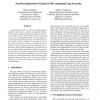213 search results - page 6 / 43 » Issues with RFID Usage in Ubiquitous Computing Applications |
WMTE
2005
IEEE
14 years 3 months ago
2005
IEEE
An additional platform for supporting learning in the same physical space in which it takes place, is now available owing to the continuous advancement of wireless and mobile tech...
MOBIHOC
2006
ACM
14 years 9 months ago
2006
ACM
Tag identification is an important tool in RFID systems with applications for monitoring and tracking. A RFID reader recognizes tags through communication over a shared wireless c...
HUC
2005
Springer
14 years 3 months ago
2005
Springer
A frameless display is a display with no perceptible boundaries; it appears to be embodied in the physical world. Frameless displays are created by projecting visual elements on a ...
CLUSTER
2002
IEEE
13 years 9 months ago
2002
IEEE
A Computational Grid is a collection of heterogeneous computers and resources spread across multiple administrative domains with the intent of providing users easy access to these...
COMPUTER
2004
13 years 9 months ago
2004
The UCSD ActiveCampus project is an exploration of wireless location-aware computing in the university setting. ActiveClass supports classroom activities such as anonymous asking ...

